- Home
- Tony Hillerman
Hunting Badger jlajc-14 Page 5
Hunting Badger jlajc-14 Read online
Page 5
Chapter Eight
Cowboy Dashee rolled down the window of Apache County Sheriff’s Department Patrol Unit 4 as Chee walked up. He leaned out, staring at Chee.
“The cooler’s in the trunk,” Dashee said. “Dry ice in it, with room enough for about forty pounds of smoked Alaska salmon caught by my Navajo friend. But where’s the damned fish?”
“I hate to tell you about that,” Chee said. “The girls had this big welcome-home salmonfest for me at Shiprock. Dancing around the campfire down by the San Juan, swimming bareback in the river. Just me and nine of those pretty teachers from the community college." Chee opened the passenger-side door and slid in. “I should have remembered to invite you.”
“You should have,” Dashee said. “Since you’re going to work me for some favor. From what you said on the telephone, you’re going to try to get me in trouble with the FBI. What do you want me to do?”
They’d met at the Lukachukai Chapter House, Chee making the long drive from Farmington over the Chuska Mountains and Dashee up from his station at Chinle. Dashee arrived a little late. And now was accused by Chee of being corrupted from his stern Hopi ways and learning how to operate on ‘Navajo Time,' which recognized neither late nor early. They wasted a few minutes exchanging barbs and grinning at one another as old friends do, before Chee answered Dashee’s question.
“What I’d like you to do is help me get straightened out on that business with the stolen airplane,” Chee said.
“Eldon Timms’s airplane? What’s to straighten out? The bandidos stole it and flew away. And thank God for that." Dashee made a wry face. “If you see it anywhere, just call the nearest office of the Federal Bureau of Investigation.”
“You think that’s what actually happened?”
Dashee laughed. “Let’s just say I hope the feds got it right this time. Otherwise, we both ought to apply for a leave. I don’t think I could stand a repeat of that Great Four Corners Manhunt of 1998. You want to go crashing around in the canyons again?”
“I could get along without that,” Chee said, and told Dashee what he’d learned about the Timms
L-17, and the insurance, and Timms’s futile effort to sell it, and all the rest. “You mind us driving over there and showing me where the pickup was found, and the barn where Timms kept the plane? Just going over that part of it with me?”
Dashee studied him. “You’re wanting to use your old buddy Cowboy because you’re not back on duty yet, and don’t have any business out there anyway even if you were. And me, being a deputy sheriff of Apache County, Arizona, could claim I had some legitimate reason to be butting in on a case the FBI has taken over. So if the feds get huffy about us nosy locals, they can blame me. Am I right?”
“That’s about it,” Chee said. “Does it make sense to you?”
Dashee snorted, started the engine. “Well, then, let’s go. Let’s get there while we still have a little daylight.”
The sun was low when Dashee stopped the patrol car. The ragged top of Comb Ridge to the west was producing a zigzag pattern of light and shadow across the sagebrush flats of the Nokaito Bench. The Gothic Creek bottoms below were already a crooked streak of darkness. Dashee was pointing down into the canyon. “Down there but for the grace of God and Timms’s convenient airplane go you and I,” he said. “Once again testing the federal law-enforcement theory that to locate fugitives you send out local cops until the perps start shooting them, thereby giving away their location.”
“It used to work in India when the nabobs were hunting tigers,” Cree said. “Only they did it with beaters instead of deputy sheriffs. They’d send those guys in to provoke the animals.”
“I thought they used goats.”
“That was later,” Chee said. “After the beaters joined the union. Now why not tell me why we’re stopping here.”
“High ground. You can see the lay of the land from here.“ Dashee pointed northeast. “Up there, maybe three miles, is the Timms place. You can’t see it because it’s beyond that ridge, down a slope." He pointed again. “This road we’re on angles along the rim of the mesa over Gothic Creek, then swings back past the Timms place, and then sort of peters out at a widow woman’s ranch up toward the San Juan. That’s the end of it. The truck was abandoned about a mile and a half up ahead.”
Chee hoisted himself onto the front fender. “All I know about this case is what I’ve heard since I got home. Fill me in. What’s the official Theory of the Crime?”
Dashee grinned. “You think the feds would tell an Apache County deputy?”
“No. But somebody in the Denver FBI, or maybe the Salt Lake office, or Phoenix, or Albuquerque, fills in some state-level cop, and he tells somebody else, and the word spreads and pretty soon somebody else tells your sheriff, and —" Chee made an all-encompassing gesture. “So everybody knows in about three hours, and the federals maintain their deniability.”
“OK,” Dashee said. “What we hear goes like this. This Teddy Bai fella, the one the FBI is holding at the Farmington hospital, he tells some of the wrong people how easy it would be to rob the Ute Casino, and the word gets back to some medium-level hoods. Maybe Las Vegas hoods, maybe Los Angeles. I’ve heard it both ways, and it’s just guesswork. Anyway, the theory is Bai gets contacted. He’s offered a slice if he’ll help with the details, like getting the timing just right, all the inside stuff they need to know. Who’s on guard when. When the bank truck comes. How to cut off the power, telephones, so forth. Bai is a flier, he tells them that Timms has this old army short-takeoff recon airplane they can grab for the getaway. He’ll fly it for them. But they know that Bai’s local. He’ll be missed. He’ll be the way the hoods planning this can be traced. So they bring along their own pilot, shoot Bai, drive out to the Timms place, tear up the pickup truck so the cops will think they had to abandon it out here, steal the plane and"—(Dashee flapped his arms)—"away they go.”
Chee nodded.
“You’re thinking about Timms,” Dashee said. “The theory is they planned to kill him, too. That would have given them more time. But he wasn’t home. On his way home Timms heard about the robbery on the news and then found the lock on his barn busted, and his airplane gone, and he notified the cops. And since we’re closest, we got sent to check it out.”
Chee nodded again.
“You don’t like that, either?”
“I’m just thinking,” Chee said. “Show me where they left the truck.”
Doing that took them into the rugged, stony treeless territory where no one except surveyors seems to know exactly where Arizona ends and Utah begins. It involved a descent on a bad dirt road from the mesa top and took them past a flat expanse of drought-dwarfed sage where a white tanker truck was parked with its door open and a man sitting in the front seat reading something.
Dashee waved at him. “Rosie Rosner,” Dashee said. “Claims he has the easiest job in North America. Even easier than being a deputy. Three or four times a day an Environmental Protection Agency copter flies in here, he refuels it, and then nods off again until it comes back.”
“I think I saw that copter at the Farmington Airport,” Chee said. “Guy there said they’re locating abandoned uranium mines. Looking for radioactive dumps.”
“I asked the guy if he’d seen our bandidos driving in,” Dashee said. “But no such luck. They started doing this the next day.”
Dashee honked at the driver and waved. “Come to think of it, I guess the timing was pretty lucky for him.”
About a mile beyond the refueling truck Dashee stopped again and got out.
“Take a look at this.“ He pointed to a black outcrop of basalt beside the track, partly hidden by an outstretched limb of a four-wing salt bush and a collection of tumbleweeds.
“Here’s where they banged up their oil pan on the truck,” he said. “Either they didn’t know the road, or they weren’t paying attention or they swerved just a little bit to do it on purpose.”
“So we’d think they abandon
ed the truck because they didn’t have any choice,” Chee said.
“Maybe. You’d see they didn’t drive it much farther.”
After another few hundred yards Dashee turned off the packed earth of the unimproved road into an even vaguer track. He rolled the patrol car down a slope into a place where humps of blown sand supported a growth of Mormon tea and a few scraggly junipers.
“Here we are,” he said. “I’m parking just about exactly where they left the pickup.”
Chee climbed one of the mounds, looked down at the place the truck had been and all around.
“Could you see the truck from the track? Just driving past?”
“If you knew where to look,” Dashee said. “And Timms would have noticed the oil leak, and the tracks turning off. He would have been looking.”
“You find any tracks?”
“Sure,” Dashee said. “Both sides of the truck where they got out. Two sets. Then somebody told the feds, and here comes the copters full of the city boys in their bulletproof suits.”
“The copters blew away the tracks?”
Dashee nodded. “Just like they did it for us in the ‘98 business. When I called it in, I asked ’em to warn the feds about that.” Dashee laughed. “They said that’d be like trying to tell the pope how to hear confessions. Anyway, the light wasn’t too bad, and I took a roll of photographs. Boot prints and the places they put stuff they unloaded.”
“Like what?”
“Mark left by a rifle butt. Something that might have been a box. Big sack. So forth.“ Dashee shrugged.
Chee laughed. “Like a sack full of Ute Casino money, maybe. By the way, how much did they get?”
“An “undetermined amount,” according to the FBI. But the unofficial and approximate estimate I hear it was four hundred and eighty-six thousand, nine hundred and eleven dollars.”
Chee whistled.
“All unmarked money, of course,” Dashee added. “And lots of pockets full of big-value chips which honest folks grabbed off the roulette tables while escaping in the darkness.”
“Did the tracks head right off toward the Timms place? Or where?”
“We didn’t have much time to look. The sheriff called right back and said the FBI wanted us not to mess around the scene. Just back off and guard the place.”
“Not much time to look, huh?” Chee said. “What did you see when you did look? What was in the truck?”
“Nothing much. They’d stolen it off of one of those Mobil Oil pump jack sites, and it had some of those greasy wrenches, wipe rags, empty beer cans, hamburger wrappers, so forth. Stuff left under the seats and on the floorboards. Girlie magazine in a door side pocket, receipts for some gas purchases.“ Dashee shrugged. “About what you’d expect.”
“Anything in the truck bed?”
“We thought we had something there,” Dashee said. “A good-as-new-looking transistor radio there on the truck bed. Looked expensive, too.“ He shrugged. “But it was broken.”
“Broken. It wouldn’t play?”
“Not a sound,” Dashee said. “Maybe the battery was down. Maybe it broke when whoever threw it back there.”
“More likely they threw it back there because it was already broken,” Chee said. He was staring westward, down into the wash, and past it into the broken Utah border country, the labyrinth of canyons and mesa where the Navajo Tribal Police, and police from a score of other state, federal and county agencies had searched for the killers in the ’98 manhunt.
“You know, Cowboy,” Chee said, ”I’ve got a feeling we’re a little bit north of your jurisdiction here. I think Apache County and Arizona stopped a mile or two back there and we’re in Utah.”
“Who cares?” Dashee said. “What’s more interesting is you can’t see Timms place from here. It’s maybe a mile down the track.”
“Let’s go take a look,” Chee said.
It was, judging by the police car odometer, 1.3 miles. The road wandered down a slope into a sagebrush flat, to a pitched-roof stone house and a cluster of outbuildings. A plank barn with a red tar-paper roof dominated the scene. From a pole jutting above it a white wind sock dangled, awaiting a breeze to return it to duty. Chee noticed an east-west strip of the flat had been graded clear of brush. He also noticed that the road continued beyond this place, reduced to a set of parallel ruts and wandering across the flat to disappear over a ridge.
Chee pointed. “Where’s it go?”
“Another three, four miles, there’s another little ranch, the widow I told you about,” Dashee said. “It dead-ends there.”
“No outlet then? Back to the highway?”
“Unless you can fly,” Dashee said.
“I had been thinking that maybe the perps had turned off on this road figuring they’d circle past a roadblock on U.S. 191 up toward Bluff. I guess that would mean they didn’t know this country.”
“Yeah,” Dashee said, "I thought about that. The feds figured it means they knew the Timms airplane was there waiting for them.”
“Or they knew a trail down into Gothic Canyon, and down that to the San Juan, and down the river to some other canyon.”
“Oh, man,” Dashee said. “Don’t even think of that.“ And he pulled the car into Eldon Timms’s dusty yard.
A woman was standing on the shady side of the house watching them. Wearing jeans, well-worn boots, a man’s shirt with the sleeves rolled and a wide-brimmed straw hat. About middle seventies, Chee guessed. But maybe a little younger. Whites didn’t have the skin to deal with this dry sunshine. They wrinkled up about ten years early. She was walking toward the car as Chee and Dashee got out, squinting at them.
“That’s Eleanor Ashby,” Dashee said. “Widow living over the hill there. She looks after Timms’s livestock when he’s away. She said they trade off.”
“Sheriff,” Eleanor Ashby said, "what brings you back over here? You forget something?”
“We were looking for Mr Timms,” Dashee said, and introduced Chee and himself. “I forgot some things I wanted to ask him.”
“You needed to go to Blanding to do that,” she said. “He headed up there this morning to talk to the insurance people.”
“Well, it’s nothing important. Just some details I needed to fill in for the paperwork. I forgot to ask him what time of day it was he got back here and found his airplane was missing. But it can wait. I’ll catch him next time I get back up this way.”
“Maybe I can help you with that,” Eleanor said. “Let me think just for a minute, and I can get close to it. He was supposed to bring me some stuff from Blanding, and I thought I’d heard an airplane, so I came on over. Thinking he’d gotten home, but he wasn’t back yet.”
“About noon?” Chee asked. “You’re lucky you weren’t here when the bandits were.”
“Don’t I know it,” Eleanor said. “They just might have shot me. Or taken me as a hostage. God knows what. Still scares me when I think about it.”
“That plane you heard. You think that was the bandits flying off in Mr Timms’s airplane?”
“No. I just figured Timms had flown over to take a look, and then went on over to the other little place he has over by Mexican Water.”
Chee looked at Dashee and found Dashee looking at him.
“Wait a minute,” Dashee said. “You mean Timms had flown the plane up to Blanding?”
Eleanor laughed. “Course not,” she said. “But that’s what I was thinking. Sometimes he took the plane, if he could land where he was going. Sometimes he took his truck.”
“But the plane was here when you came by at noon?” Chee asked.
She nodded. “Yeah. Locked in the barn.”
“You saw it in there?”
“I saw that big old lock he uses on the door hasp." She chuckled. “You lock that old airplane in there, it can’t get out.”
“You didn’t see his truck?” Chee asked.
“It wasn’t here. He -" She frowned at Chee. “What do you mean. What are you thinking?”
“He keeps it in that shed behind the house,” Mrs Eleanor Ashby said, and her expression suggested she suddenly was confronting a headful of questions.
“You weren’t here when Timms finally did get home?” Dashee asked.
“I was back at my house. Then the next day, a car drove up with the two FBI men in it. They asked me if I’d heard an airplane flying over. I told them what I’ve told you. They wanted to know if anybody had come around the Timms place while I was there. I said no. That was about it.”
That was about it for Dashee and Chee as well. They took a look at the barn, at the broken hasp, looked around for tracks and found nothing useful. Then they drove south through the dying red flare of twilight toward Mexican Water, where Eldon Timms had his other little place, where they dearly hoped, prayed, in fact, they would not find an L-17 hidden.
“If it’s there,” Dashee said, "then I tell the sheriff, and he tells the FBI, and old Eldon Timms gets sent up for insurance fraud and what else? Obstruction of justice?”
“Probably,” Chee said. But he was thinking of three men, nameless, faceless, utterly unidentified, armed with automatic rifles. They had already killed a policeman, wounded another and tried to kill a third. Three killers at large in the Four Corners canyon country. He was wondering how many more would die before this thing was over.
Chapter Nine
The little map Potts had drawn for Leaphorn on a sheet of notepaper took him across the San Juan down the asphalt of Highway 35 into the Aneth Oil Field, and thence onto a dirt road which led up the slopes of Casa Del Eco Mesa. It wandered past the roofless, windowless stone buildings which Potts had said were the relics of Jorie’s ill-fated effort to run a trading post. Two dusty, bumpy miles later it brought him to the drainage that Potts had labeled Desert Creek. Leaphorn stopped there, let the dust settle a moment and looked down the slope. He saw a crooked line of pale green cottonwoods, gray-green Russian olives and silver-gray chamisa brush marking the course of the creek, the red roof of a house, a horse corral, sheep pens, a stack of hay bales protected by a vast sheet of plastic, and a windmill beside the round galvanized-metal form of the tank which received its water. Snaking down the slope along the road was a telephone line, sagging along between widely spaced poles.

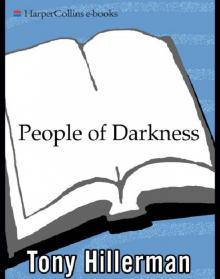 People of Darkness
People of Darkness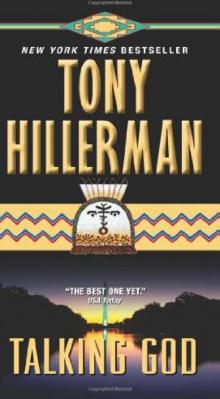 Talking God jlajc-9
Talking God jlajc-9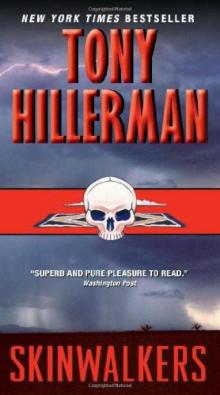 Skinwalkers jlajc-7
Skinwalkers jlajc-7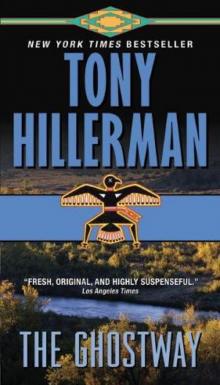 The Ghostway jlajc-6
The Ghostway jlajc-6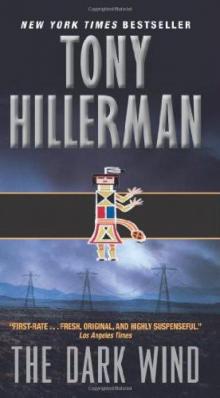 The Dark Wind jlajc-5
The Dark Wind jlajc-5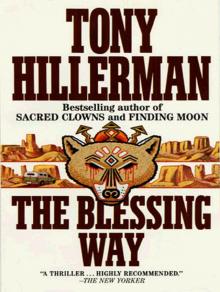 The Blessing Way
The Blessing Way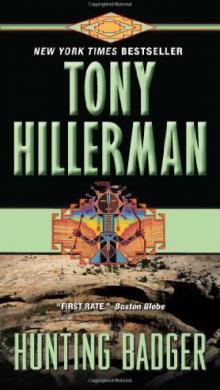 Hunting Badger jlajc-14
Hunting Badger jlajc-14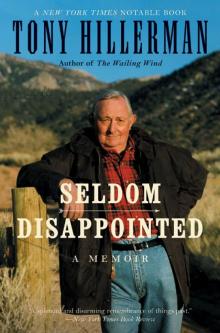 Seldom Disappointed: A Memoir
Seldom Disappointed: A Memoir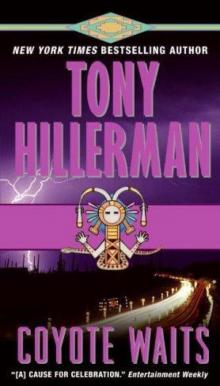 Coyote Waits jlajc-10
Coyote Waits jlajc-10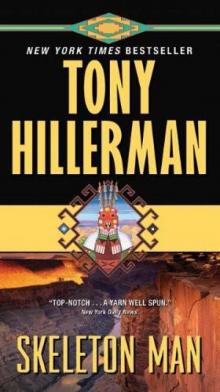 Skeleton Man jlajc-17
Skeleton Man jlajc-17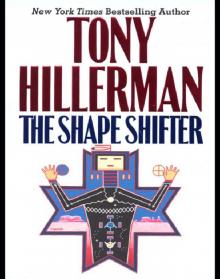 The Shape Shifter
The Shape Shifter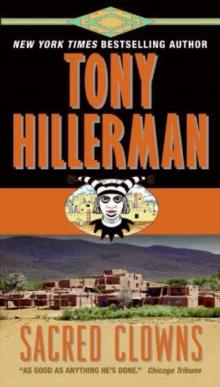 Sacred Clowns jlajc-11
Sacred Clowns jlajc-11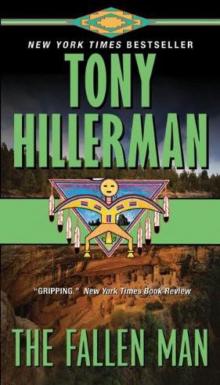 The Fallen Man jlajc-12
The Fallen Man jlajc-12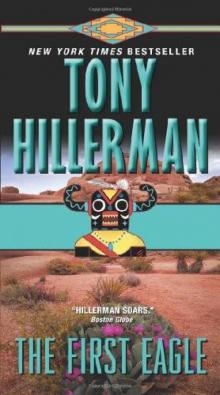 The First Eagle jlajc-13
The First Eagle jlajc-13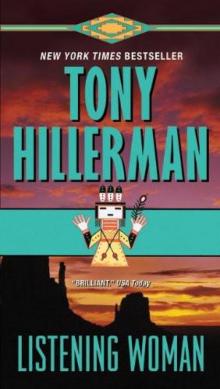 Listening Woman jlajc-3
Listening Woman jlajc-3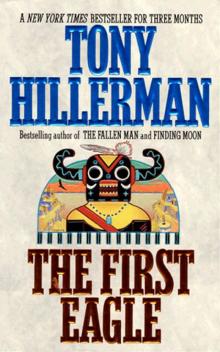 The First Eagle
The First Eagle Skeleton Man
Skeleton Man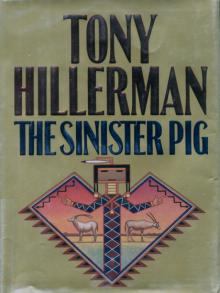 The Sinister Pig jlajc-16
The Sinister Pig jlajc-16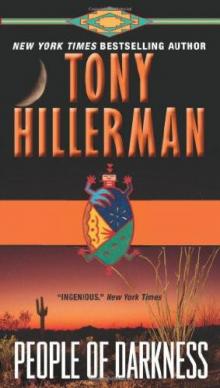 People of Darkness jlajc-4
People of Darkness jlajc-4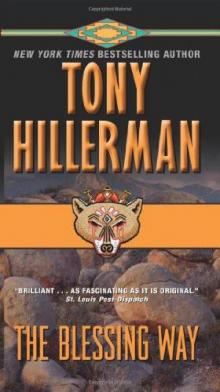 The Blessing Way jlajc-1
The Blessing Way jlajc-1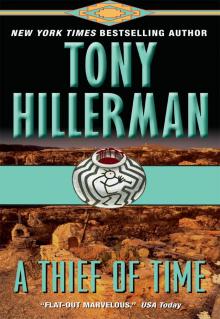 A Thief of Time
A Thief of Time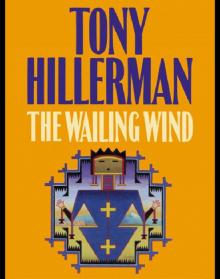 The Wailing Wind
The Wailing Wind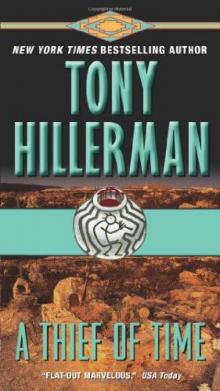 A Thief of Time jlajc-8
A Thief of Time jlajc-8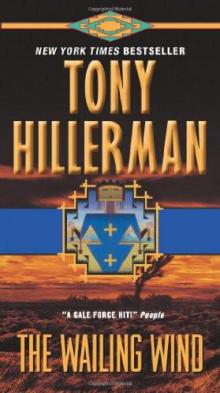 The Wailing Wind jlajc-15
The Wailing Wind jlajc-15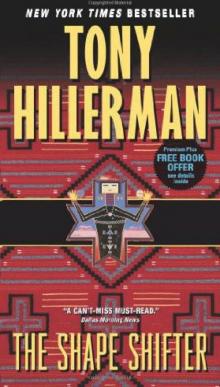 The Shape Shifter jlajc-18
The Shape Shifter jlajc-18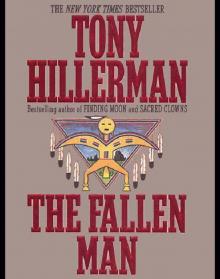 The Fallen Man
The Fallen Man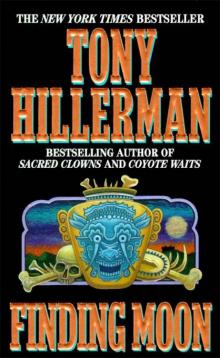 Finding Moon
Finding Moon